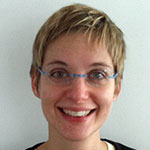Image-guidance, Precision Diagnosis and Therapy Research Fellowship
This novel clinical research training program is designed to provide dedicated training for MDs and PhDs in the technical knowledge, practical clinical application and experience in Image Guided Therapy (IGT). Imaging is integral to patient care, both in and out of the hospital today. It provides a precise, personalized diagnostic “road-map” for interventions such as biopsies, ablations, surgery and radiation oncology. IGT involves image guidance with image processing, analysis, and precision diagnosis through multi-source data integration for therapies- procedures/surgeries involving multiple disciplines of procedural medicine, radiation oncology and surgery.

Program Co-Director
View Profile

Program Co-Director
View Profile

Director of Education
View Profile
Six Thematic Areas
- Multiomics-based Quantitative Biomarkers for Image-guided Interventions
Faculty mentors: Andriy Fedorov PhD, Fiona Fennessy MD PhD, Clare Tempany MD, Hugo Aerts PhD
This thematic area will focus on Imaging first and foremost-all fellows will have dedicated time to train, learn and observed both diagnostic and interventional radiologists, attend resident teaching and all departmental teaching events. The research focuses on the computational analysis of the quantitative image features extracted from multiparametric MRI (mpMRI) radiographic phenotype (radiomics) samples. The underlying hypothesis is that genomic heterogeneity leads to intra-tumoral heterogeneity, which can be quantified through imaging. Diehn et al. described MRI as demonstrating an ‘in vivo portrait’ of genome-wide gene expression in glioblastoma multiforme, echoed in hepatocellular carcinoma. In prostate cancer, there is also evidence of strong associations between MRI and prostate cancer risk gene expression profiles. In this thematic area, we will focus on radiomics integrated into a decision support pipeline to provide state of the art computational data modeling to guide tissue diagnostics in cancer. - Navigation, Robotics, Visualization Technologies for Image-guided Interventions
Faculty mentors: Nobuhiko Hata PhD, Junichi Tokuda PhD
Other faculty: Kemal Tuncali MD, Jayender Jagadeesan PhD, Raphael Bueno MD, Robert Cormack PhD
The primary goal of this thematic area is to develop and validate novel robotics systems, in particular, computer vision, manipulators, and visualization and navigation methods in IGT. Our current research focuses on enabling/robotic technologies as applied in MRI-guided and CT-guided interventions/therapies of abdominal and pelvic organs (including radiation Oncology) and navigated pulmonary endoscope. The devices/robots are developed in-house facilities, or in collaboration with industrial partners, and integrated with the 3D Slicer navigation software. 3D Slicer has not only shown to be effective as a translational clinical research tool in AMIGO but also proven to be a powerful and portable open-source engineering vehicle for collaborations. For the development of robots, we have established a process for documentation, safety and risk assessment, and validation protocols to ensure safe delivery of the robot to the clinics. The trainee of the program, therefore, can learn the end-to-end process of medical device development, technology transfer, the FDA landscape/requirements and deployment. - Magnetic Resonance Guided Focused Ultrasound Surgery (MRgFUS)
Faculty mentors: Nathan McDannold PhD, Clare Tempany MD, Fiona Fennessy MD PhD
Other faculty: Rees Cosgrove, MD (Neurosurgery)
MRgFUS was pioneered at BWH by Ferenc Jolesz and Kullervo Hynynen, and the MRgFUS laboratory, now led by Nathan McDannold, continues to investigate this technique, its fundamental methods and clinical applications. It is a non-invasive and incision-free therapeutic technology with the potential to transform the treatment for many disorders, using ultrasonic energy to target tissue deep in the body without incisions or radiation. MRgFUS pairs ultrasound (which provides the energy to treat tissue deep in the body precisely and noninvasively), and MRI (which is used to identify and target the tissue to be treated, guide and control the treatment in real time, and confirm the effectiveness of the treatment). The mentors have extensive experience in both the therapeutic delivery of MRgFUS (e.g. uterine fibroid disease, essential neurological tremor and palliative treatment for bone metastases) and in the complex engineering that is necessary for Blood Brain barrier disruption and clinical outcome optimization, in addition to the working towards payor approval for this technology. A current pre-FDA trial in MRgFUS for localized prostate cancer is being conducted at BWH (PI Tempany), providing a unique opportunity for trainees to see the technology in action. In this thematic area, trainees have the opportunity to be trained by a multidisciplinary team in this novel and innovative disruptive technology. - Advanced MR Imaging Techniques and Computational Image Analysis
Faculty mentors: Carl-Fredrik Westin PhD, Lauren O’Donnell PhD
Other faculty: Bruno Madore PhD
Researchers at BWH have a long and important history in the area of advanced MR imaging techniques and computational image analysis. This work spans multiple fields, from MR physics to computational algorithm development, open-source software that enables worldwide research. Advances in MR physics, pioneered by our group include novel imaging techniques for accelerated, hybrid, thermometry and microstructure imaging. Advances in computational image analysis include work in image registration, identification of fiber tracts in the brain, statistical analyses of diffusion MRI, and numerous neuroimaging studies with clinical collaborators. Advances in open-source software include the internationally popular 3D Slicer platform, originally developed at BWH and MIT, and the recent release of SlicerDMRI for diffusion MRI neuroimage analysis. In this thematic area, the trainees have the opportunity to be trained by a multidisciplinary team that spans multiple technical areas of high promise in the future of MR and MR-guided interventions. - Machine Learning Technology for Image-guided Therapy
Faculty mentors: Ron Kikinis MD, William Wells PhD, Tina Kapur PhD
Other faculty: Raul San Jose Estepar PhD, Andriy Fedorov PhD
This thematic area will focus on the applications of machine learning, including techniques in deep learning, to various problems of detection and classification in image-guided therapy. Research areas that are currently being actively investigated by faculty in this theme include the development of novel biomarkers of for Chronic Obstructive Pulmonary Disease (COPD), brain disease, MR-based pelvic cancer interventions including biopsy and brachytherapy, as well as an open source software toolkit, DeepInfer, that enable reuse of deep learning methods from the literature. In this thematic area, technical trainees will have the opportunity to develop machine learning based algorithms that leverage large repositories of annotated data at BWH and write open source software for 3D Slicer platform and the DeepInfer Toolkit, while clinical trainees have the opportunity to learn apply already-developed learning models to new data without the need for software development or configuration. Research and training in this theme will leverage the substantial intellectual and computing resources of the recently established Center for Clinical Data Science in Boston where the goal is to use machine learning to enable clinical applications, from early stage R&D efforts through to clinical validation and commercialization via channel partners. - Mass Spectrometry Based Biomarkers
Faculty Mentors: Nathalie Agar PhD, Alexandra Golby MD
Intraoperative mass spectrometry was pioneered at BWH by Dr. Nathalie Agar. A number of mass spectrometry platforms are used to provide real or near real-time characterization of surgical tissue at the molecular level to support surgical decision-making. Together with Dr. Alexandra Golby, they have validated a protocol to use some of the molecular to assess IDH mutation status of a tumor during surgery and monitor the distribution of the resulting onco-metabolite 2-hydroglutarate to guide glioma surgery. Her group is also leading the development and validation of protocols for the surgery of pituitary tumors, and the assessment of surgical margins in breast conserving surgery for the treatment of breast cancer. Dr. Agar has also introduced the application of mass spectrometry imaging to assess the permeability of targeted therapeutics across the blood-brain barrier (BBB) in preclinical animal models and clinical trials for CNS metastasis and primary brain tumors. Her work to support drug development is currently used to prioritize compounds in pediatric brain tumor clinical trials.
Faculty
The training program has selected 14 core faculty members within the Department of Radiology and collaborating faculty from Brigham and Women’s Hospital, Harvard Medical School, Harvard School of Public Health, Massachusetts Institute of Technology, Children’s Hospital Boston, Dana-Farber Cancer Institute and Massachusetts General Hospital.
Teaching Facilities
Brigham and Women’s Hospital, Harvard Medical School, Harvard School of Public Health, Massachusetts Institute of Technology, Boston Children’s Hospital, Dana-Farber Cancer Institute, and Massachusetts General Hospital.
Application Requirements and Deadline
The “Image Guidance, Precision Diagnosis and Therapy” (IGPDT) training program at Brigham and Women’s Hospital – Harvard Medical School (BWH/HMS) is accepting applications from MD, and PhD applicants, effective immediately. Postdoctoral PhD fellows or MD physician-scientists who have completed residency (in specialties such as diagnostic/interventional radiology, surgery, radiation oncology, pathology) are eligible to apply for research/clinical training in IGPDT. Appointments will be for one to two years. Salary is commensurate with qualifications and years of training. We seek applicants of diverse backgrounds, which we believe truly enriches the training environment. We require the following document:
The Application should consist of a brief letter of interest containing addresses, telephone number(s) and US citizenship or US permanent residency status
- Names of three references
- Curriculum vitae (CV)
- Personal statement
For questions, please contact:
Fiona M. Fennessy, MD PhD
Associate Professor of Radiology
Department of Radiology
Brigham and Women’s Hospital
75 Francis Street
Boston, MA 02115
Phone: 617-632-4891
Email: ffennessy@bwh.harvard.edu
Please submit the application to:
Danielle Chamberlain
Brigham and Women’s Hospital
75 Francis Street
Boston, MA 02115
Phone: 617-525-8596
Email: dchamberlain@bwh.harvard.edu
Selection of Interview Candidates
Each application is reviewed in its entirety with an eye toward a combination of overall academic excellence, leadership ability, career development potential and personal character. The program accepts four fellows per year.
Travel and Hotel Accommodations
For the purposes of making travel arrangements, applicants may anticipate being finished with all interview and tour activities by 4pm. Applicants are expected to fund all travel costs.
